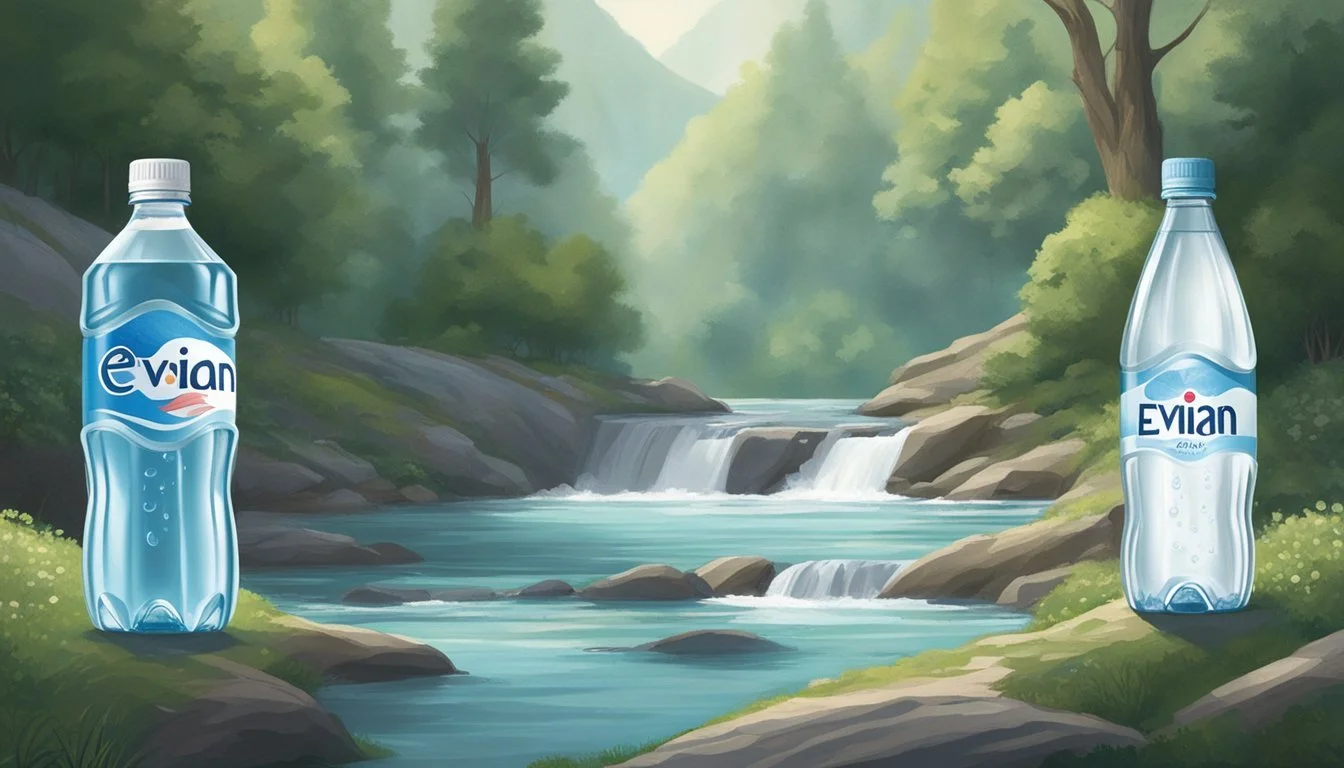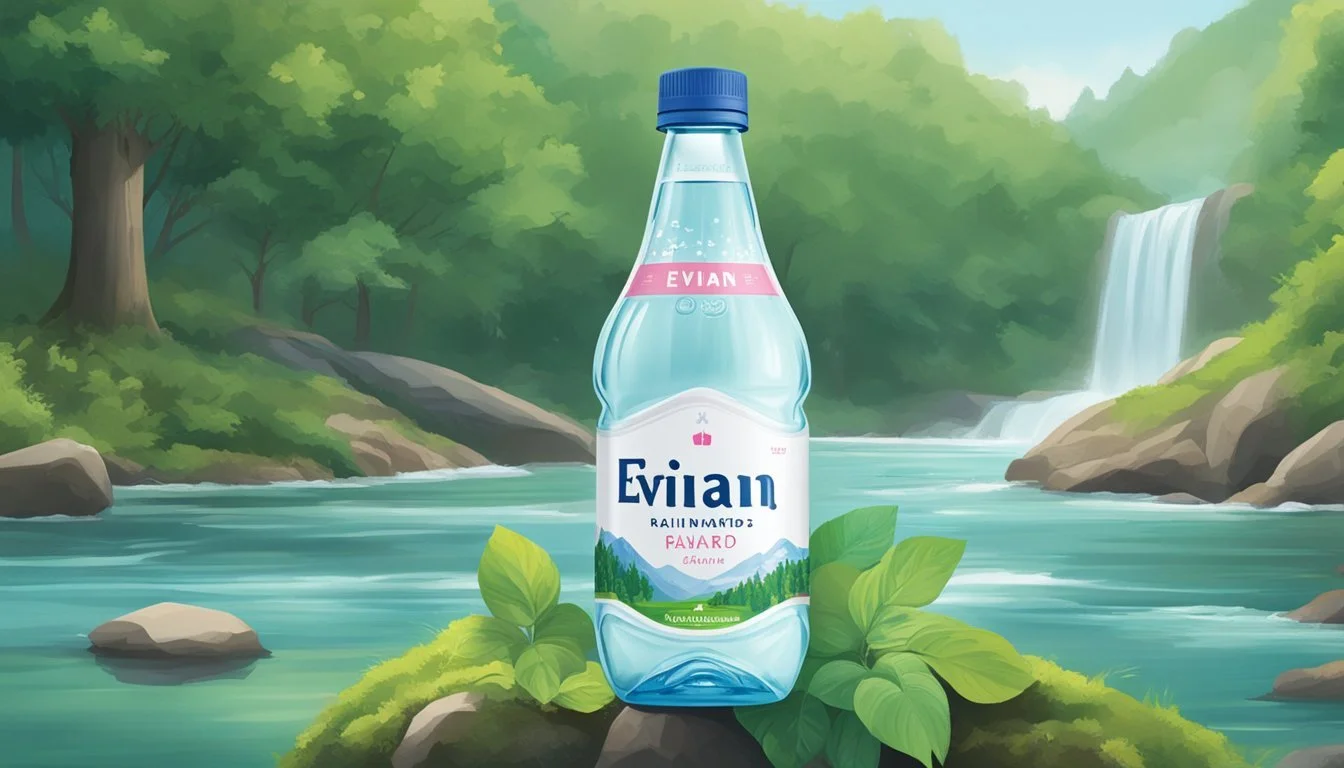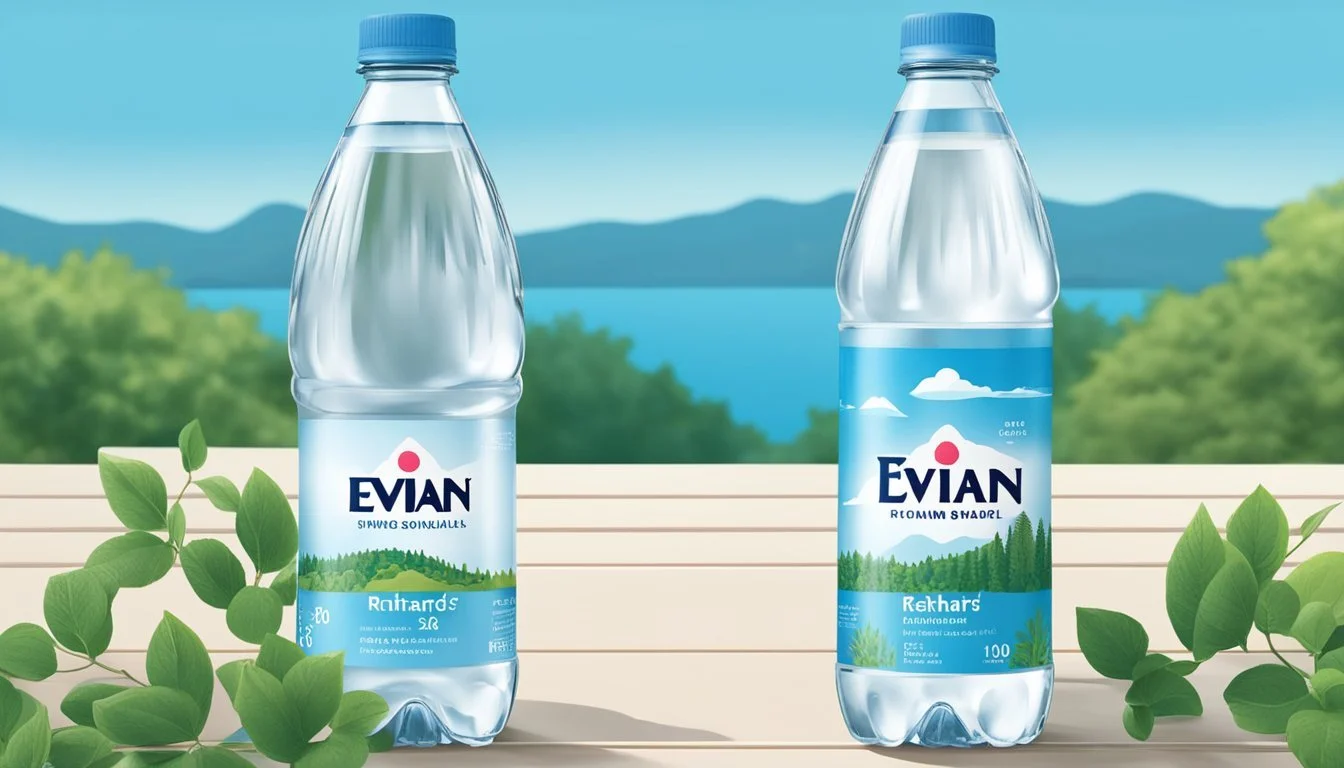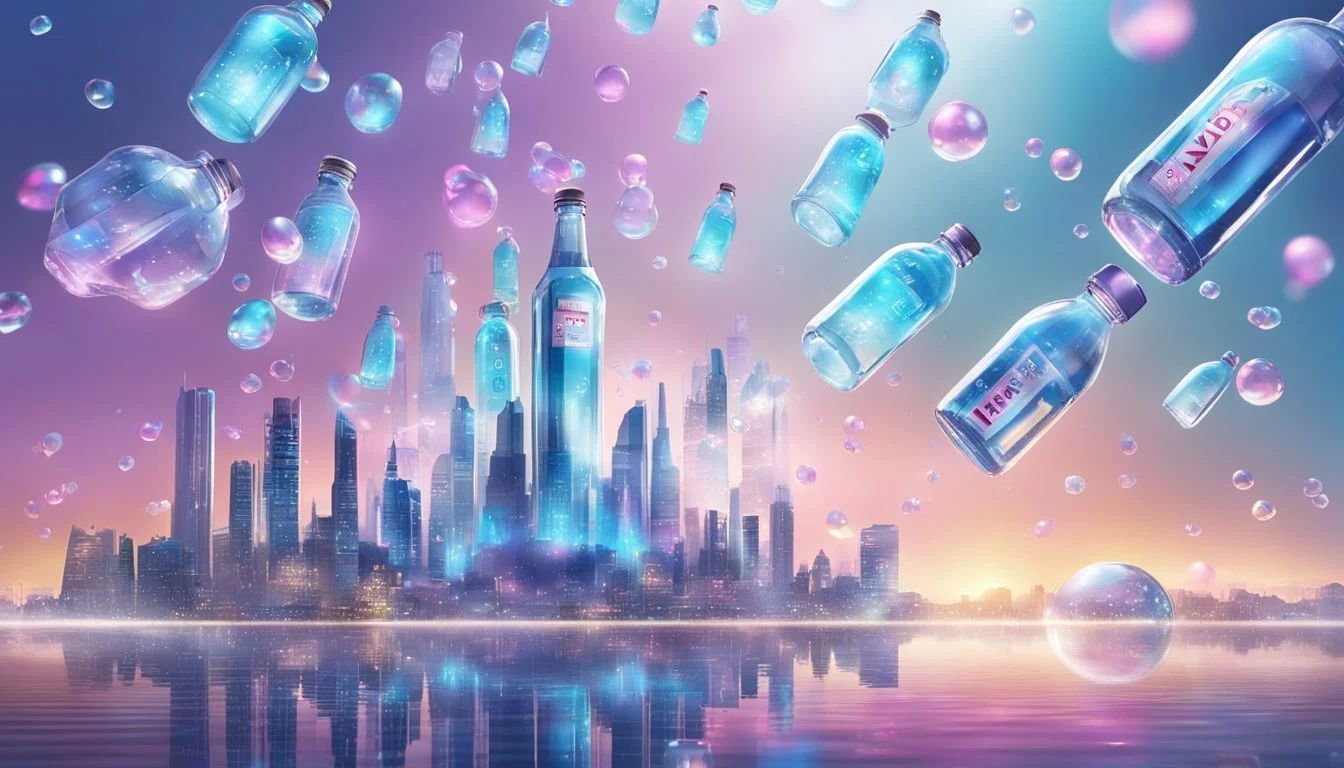Evian vs. Richard’s Rainwater
The Ultimate Bottled Water Comparison
Choosing between Evian and Richard’s Rainwater requires a closer look at their unique qualities. Evian, sourced from the French Alps, is renowned for its mineral content, especially calcium and magnesium. Richard’s Rainwater, harvested directly from rain, offers a different appeal, emphasizing its environmentally friendly approach to bottled water with minimal processing.
For those seeking a more mineral-rich option, Evian stands out as the preferred choice. Its naturally balanced profile appeals to those who value hydration with added health benefits. In contrast, Richard’s Rainwater targets eco-conscious consumers who prioritize sustainability without compromising on purity.
The debate hinges on individual preferences and what one values in their drinking water. Whether prioritizing taste, mineral content, or environmental impact, both brands provide excellent, albeit different, hydration solutions.
Understanding Bottled Water
Choosing between Evian and Richard's Rainwater involves considering the types of bottled water available and the regulations ensuring their safety.
Types of Bottled Water
Bottled water comes in several varieties, each offering unique properties and benefits. Spring water is sourced from underground aquifers and is typically rich in minerals. Mineral water must contain a certain mineral content and is often bottled at the source. Sparkling water includes natural or added carbonation, providing a fizzy option for those who prefer it over still water. Still water is simply water without carbonation.
Packaging plays a crucial role; plastic bottles are lightweight and convenient but pose environmental concerns. Glass bottles offer a more sustainable option but are heavier and less common. Brands like Evian use 100% recycled PET plastic for their bottles, which is a step towards more sustainable practices.
Regulation and Safety
In the United States, the safety of bottled water is regulated by the Food and Drug Administration (FDA), while tap water falls under the jurisdiction of the Environmental Protection Agency (EPA). The FDA sets stringent standards to ensure bottled water is free from contaminants such as fluoride and arsenic. Bottled water facilities must follow specific manufacturing processes, and regular testing is mandated to guarantee safety and quality.
Brands are also required to label their products accurately. It's crucial for consumers to check these labels for information about the water's source and mineral content. Both Evian and Richard’s Rainwater emphasize their commitment to safety and quality, with Evian touting its new carbon-neutral production site and use of recycled materials.
Brand Overview
Evian and Richard’s Rainwater offer distinct approaches to the bottled water market, each with unique sourcing and production methods.
Evian: From French Alps to the Market
Evian sources water from springs in the French Alps. Known for its purity and mineral content, Evian's water undergoes natural filtration through glacial sand, which enriches it with minerals. The brand positions itself as a premium product and is often found in upscale retailers like Whole Foods and high-end hotels.
Key Attributes:
Source: Springs in the French Alps
Filtration: Natural glacial sand
Packaging: Primarily in plastic and glass bottles
Market Presence: Strong presence in luxury markets
Retailers: Whole Foods, high-end hotels
Evian’s long-standing reputation and commitment to quality have made it a staple in the premium bottled water sector.
Richard’s Rainwater: Texas Innovation
Richard’s Rainwater is a pioneering brand from Dripping Springs, Texas. The company focuses on rainwater collection, ensuring a sustainable water source. The rainwater is collected, triple-filtered, and purified, resulting in clean and fresh-tasting water.
Key Attributes:
Source: Rainwater
Filtration: Triple filtration and purification
Packaging: Predominantly in reusable and recyclable containers
Market Presence: Emphasizes sustainability and quality
Retailers: Whole Foods, Kroger, Albertsons
The brand has made significant strides in the market, especially as sustainability becomes more important to consumers. Richard’s Rainwater is often featured in eco-friendly stores and events, aligning with its core mission of environmental responsibility.
Environmental Impact
Evian and Richard's Rainwater have distinct approaches to sustainability and environmental impact.
Evian uses recyclable plastic bottles and aims for carbon neutrality. Their commitment to reducing their carbon footprint includes optimizing resource usage and utilizing renewable energy sources in their production processes.
Richard's Rainwater packages its product in recyclable aluminum cans and glass bottles. These materials are not only recyclable but also contribute to a zero-waste initiative, minimizing environmental pollution.
Both companies emphasize the importance of renewable energy. Evian implements energy-efficient technologies in their facilities, while Richard's Rainwater harnesses rainwater, a renewable resource, reducing dependence on other water sources.
In terms of sustainability, Richard's Rainwater's approach significantly reduces environmental pollution by capturing and purifying local rainwater, thereby lessening the burden on natural aquifers and other sources.
Here’s a brief comparison:
Brand Packaging Renewable Resource Energy Use Waste Evian Recyclable plastic bottles Spring water Renewable energy sources Focus on recycling efforts Richard's Rainwater Aluminum cans, glass bottles Rainwater Rainwater harvesting process Zero-waste initiative
Both brands actively work toward reducing their environmental impact, yet their strategies differ notably in packaging materials and sources of water.
Source and Processing
Evian sources its water from natural springs located in the French Alps. This spring water travels through mineral-rich glacial sands over a 15-year period, naturally filtering and infusing the water with minerals such as calcium and magnesium.
Richard's Rainwater collects rainwater at two locations in the United States, including Kiln, Mississippi. The water is harvested directly from rain, which is considered renewable.
Evian's processing involves minimal intervention. The naturally filtered water is collected and bottled at the source, maintaining its mineral content without the need for added treatments.
Richard's Rainwater undergoes a more intensive purification process since the collected rainwater must be made potable. This process includes multiple filtration steps and reverse osmosis to ensure the water is free of contaminants.
Table: Source and Processing Comparison
Aspect Evian Richard’s Rainwater Source Natural Springs Rainwater Location French Alps Kiln, Mississippi, USA Mineral Content Naturally high Varies, treated for purity Filtration Method Natural Filtration Filtration, Reverse Osmosis Renewable Source No Yes
Evian's natural spring water offers a consistent mineral profile due to its geological journey. Richard's Rainwater, on the other hand, provides an eco-friendly option by tapping into rain, although it requires more processing to ensure its safety and purity for consumption.
Taste and Purity
Evian boasts a clean and refreshing taste sourced from the French Alps. The natural filtration through glacial sand gives it a mineral-rich composition, which many find exceptionally pure and crisp.
Richard's Rainwater, collected directly from the sky, offers a unique, soft taste. Free from ground contaminants, it provides a pure drinking experience that is hard to compare with standard bottled or tap water.
Mineral Content
Evian:
High in calcium and magnesium
Contributes to a slightly minerally taste
Richard’s Rainwater:
Minimal mineral content
Taste described as smooth and almost sweet
Both waters are free of common municipal water additives like chlorine and fluoride, which can affect taste and purity.
Contaminant-Free
Evian:
Naturally filtered, low in industrial contaminants
Richard’s Rainwater:
Pure because it bypasses ground-level pollutants
In terms of purity, Evian’s rigorous natural filtration and Richard’s rainwater collection methods ensure minimal contaminants, making both excellent choices for those prioritizing clean drinking water.
Comparison Table
Feature Evian Richard's Rainwater Source French Alps Collected Rainwater Taste Mineral-rich, crisp Soft, smooth Main Minerals Calcium, Magnesium Minimal Common Contaminants Filtered out naturally Absent due to rain source
Each offers distinct sensory experiences with their unique sources and mineral content.
Consumer Experience
Evian and Richard’s Rainwater present distinct consumer experiences shaped by their brand messaging, marketing strategies, retail presence, and distribution networks.
Brand Messaging and Marketing
Evian positions itself as a premium brand, often linked to luxury and health. Sourced from the French Alps, the brand emphasizes its natural filtration process and mineral content. This makes it popular among consumers looking for a high-end, mineral-rich bottled water. Evian's marketing often highlights its elite status, using endorsements and sophisticated advertising.
Richard’s Rainwater markets itself with a focus on sustainability and innovation. The concept of harvesting rainwater and bottling it appeals to eco-conscious consumers. Their messaging leverages the novelty of their method, portraying the brand as both environmentally responsible and cutting-edge. This unique approach sets it apart in the crowded bottled water industry.
Retail Presence and Distribution
Evian has a widespread retail presence globally, found in premium outlets, grocery chains like Whole Foods, and high-end restaurants. Their distribution network is extensive, ensuring accessibility in multiple regions. This wide availability enhances brand loyalty and drives significant sales.
Richard’s Rainwater, while newer and more niche, is gaining ground in retail distribution. It is available in select health-focused and environmentally-conscious stores such as Whole Foods. Their strategic placement in stores that align with their brand values helps build a dedicated customer base. This targeted retail strategy supports the brand’s goal of appealing to environmentally-aware consumers.
Both brands employ distinct strategies in terms of availability, aiming to meet their respective consumer preferences and values efficiently.
Health Considerations
When comparing the health benefits of Evian and Richard’s Rainwater, several factors come into play. Both types of water offer clean, potable options with unique characteristics.
Evian water is sourced from the French Alps. Its mineral content includes calcium, magnesium, and bicarbonate, making it a good option for those who want mineral-rich water. It also contains small amounts of fluoride, which can strengthen teeth.
Richard’s Rainwater, on the other hand, is collected from rainwater through a rigorous potable rainwater collection process. This method ensures the water is free from contaminants and chemicals often found in tap water, providing an alternative for those seeking pure hydration.
One notable difference is pH levels. Evian has a pH of 7.07, making it slightly alkaline. Alkaline water is often preferred for balancing body acidity. Richard's Rainwater usually maintains a neutral pH, close to 7, making it neither too acidic nor too alkaline.
Arsenic levels are another consideration. Bottled water brands are required to keep arsenic levels well below the safety limits set by health authorities. Both Evian and Richard’s Rainwater comply with these standards, ensuring safe consumption.
For skin health, Evian contains silica, which may have benefits such as reducing inflammation and improving skin texture. Richard’s Rainwater, being free from additives, is especially appealing for those with sensitive skin.
In brief, both Evian and Richard’s Rainwater offer healthy drinking options with specific strengths. Shoppers might choose based on their preference for mineral content, pH level, and additional health benefits.
Comparative Analysis
Source: Evian is sourced from the French Alps, offering a naturally filtered water renowned for its purity. Richard’s Rainwater, on the other hand, is harvested from rainwater, ensuring a unique and fresh perspective on bottled water sources.
Taste: Evian features a distinctive mineral taste due to its rich mineral content. Richard's Rainwater tends to have a crisp and clean flavor profile that is often appreciated for its simplicity.
Environment: Evian has been making strides in sustainability. Its bottles are now made from 100% recycled PET plastic, and they aim for carbon neutrality with a new project site in 2024. Richard’s Rainwater promotes environmental consciousness by bottling rainwater and reducing reliance on groundwater resources.
Packaging: Evian’s commitment to sustainability extends to its packaging, with a plan to use entirely recycled plastic by 2025. Richard’s Rainwater also emphasizes eco-friendly packaging solutions, contributing to their environmental ethos.
Price: Evian is often positioned as a premium brand, which can reflect in its pricing, making it on the pricier side of bottled waters. Richard's Rainwater might offer a competitive price, but this can vary based on region and availability.
Factor Evian Richard’s Rainwater Source French Alps Rainwater Taste Mineral-rich Crisp and Clean Environment 100% recycled PET, Carbon-neutral Rainwater harvesting, Eco-friendly packaging Packaging Recycled plastic (by 2025) Eco-friendly solutions Price Premium Competitive
Both brands offer unique experiences and benefits, catering to different preferences and values.
Future of Bottled Water
The bottled water industry faces numerous challenges and opportunities as it looks toward the future. Environmental concerns demand that companies focus on sustainability and reduce their ecological footprint. Drought and water shortages make the efficient use of water more critical than ever.
Rainwater harvesting provides a promising solution. Brands like Richard’s Rainwater have started harnessing rainwater, presenting a renewable option. By capturing rain before it hits the ground, they ensure minimal impact on existing freshwater sources.
Market trends indicate a rise in consumer awareness about the sources of bottled water. Consumers increasingly demand transparency and ethical practices from brands. This shift pushes companies to innovate and adopt more sustainable practices.
Legislation is also a key driver. Stricter guidelines on water usage and plastic waste compel the industry to adapt. For instance, regulations promoting biodegradable packaging could significantly shape future practices.
Investment in cutting-edge technologies for filtration and purification will likely continue. These advancements ensure the quality and safety of bottled water while minimizing resource usage.
The industry must navigate the balance between profit and sustainability. Cost-effective, sustainable methods combined with consumer preferences will shape the landscape. Companies like Evian and Richard’s Rainwater exemplify different approaches but share common goals of efficiency and environmental stewardship.
The future of bottled water hinges on collaboration across sectors. Governments, corporations, and consumers must work together. Embracing innovations will secure the water industry's viability and its alignment with global sustainability goals.
More About Evian
Evian vs Mountain Valley Spring Water: Which Bottled Water is Better?
Evian vs Whole Foods Italian Still Mineral water: Which Bottled Water is Better?
More About Richard’s Rainwater
Acqua Pana vs Richard's Rainwater: Which Bottled Water is Better?
Alkaline88 vs Richard's Rainwater: Which Bottled Water is Better?
Antipodes vs Richard's Rainwater: Which Bottled Water is Better?
Aqua Carpatica vs Richard's Rainwater: Which Bottled Water is Better?
Aquafina vs Richard's Rainwater: Which Bottled Water is Better?
Arrowhead vs Richard's Rainwater: Which Bottled Water is Better?
Boxed Water vs Richard's Rainwater: Which Bottled Water is Better?
Cascade Mountain vs Richard's Rainwater: Which Bottled Water is Better?
Castle Rock vs Richard's Rainwater: Which Bottled Water is Better?
Cirro vs Richard's Rainwater: Which Bottled Water is Better?
Richard's Rainwater vs HFactor: Which Bottled Water is Better?
Core Hydration vs Richard's Rainwater: Which Bottled Water is Better?
Crystal Geyser vs Richard's Rainwater: Which Bottled Water is Better?
Deer Park vs Richard's Rainwater: Which Bottled Water is Better?
Erewhon vs Richard's Rainwater: Which Bottled Water is Better?
Essentia vs Richard's Rainwater: Which Bottled Water is Better?
Eternal vs Richard's Rainwater: Which Bottled Water is Better?
Ethos vs Richard's Rainwater: Which Bottled Water is Better?
Hawaii Volcanic vs Richard's Rainwater: Which Bottled Water is Better?
Hawaiian Springs vs Richard's Rainwater: Which Bottled Water is Better?
Ice Mountain vs Richard's Rainwater: Which Bottled Water is Better?
Icelandic Glacial vs Richard's Rainwater: Which Bottled Water is Better?
Just Water vs Richard's Rainwater: Which Bottled Water is Better?
Kroger vs Richard's Rainwater: Which Bottled Water is Better?
LIFEWTR vs Richard's Rainwater: Which Bottled Water is Better?
Liquid Death vs Richard's Rainwater: Which Bottled Water is Better?
Mananalu vs Richard's Rainwater: Which Bottled Water is Better?
Mountain Valley Spring Water vs Richard's Rainwater: Which Bottled Water is Better?
Nestle Pure Life vs Richard's Rainwater: Which Bottled Water is Better?
Origin vs Richard's Rainwater: Which Bottled Water is Better?
Ozarka vs Richard's Rainwater: Which Bottled Water is Better?
Penta vs Richard's Rainwater: Which Bottled Water is Better?
Perrier vs Richard's Rainwater: Which Bottled Water is Better?
Poland Spring vs Richard's Rainwater: Which Bottled Water is Better?
Purely Sedona vs Richard's Rainwater: Which Bottled Water is Better?
Richard's Rainwater vs 1907water: Which Bottled Water is Better?
Richard's Rainwater vs 7-Select: Which Bottled Water is Better?
Richard's Rainwater vs Action: Which Bottled Water is Better?
Richard's Rainwater vs Big Chill: Which Bottled Water is Better?
Richard's Rainwater vs Big Win: Which Bottled Water is Better?
Richard's Rainwater vs BodyArmor: Which Bottled Water is Better?
Richard's Rainwater vs CBD Living: Which Bottled Water is Better?
Richard's Rainwater vs Crystal Lake: Which Bottled Water is Better?
Richard's Rainwater vs Dasani: Which Bottled Water is Better?
Richard's Rainwater vs Essence pH10: Which Bottled Water is Better?
Richard's Rainwater vs Kirkland Signature: Which Bottled Water is Better?
Richard's Rainwater vs Open Water: Which Bottled Water is Better?
Richard's Rainwater vs Ophora: Which Bottled Water is Better?
Richard's Rainwater vs Proud Source: Which Bottled Water is Better?
Richard's Rainwater vs Pure Life: Which Bottled Water is Better?
Richard's Rainwater vs Ramona: Which Bottled Water is Better?
Richard's Rainwater vs Refreshe: Which Bottled Water is Better?
Richard's Rainwater vs Simple Truth: Which Bottled Water is Better?
Richard's Rainwater vs Skyra: Which Bottled Water is Better?
Richard's Rainwater vs Talking Rain AQA: Which Bottled Water is Better?
Richard's Rainwater vs The Well: Which Bottled Water is Better?
Richard's Rainwater vs Weird Water: Which Bottled Water is Better?
Richard's Rainwater vs Whole Foods 365: Which Bottled Water is Better?
Richard's Rainwater vs Zenwtr: Which Bottled Water is Better?
San Pellegrino vs Richard's Rainwater: Which Bottled Water is Better?
Smartwater vs Richard's Rainwater: Which Bottled Water is Better?
Solan de Cabras vs Richard's Rainwater: Which Bottled Water is Better?
Starkey vs Richard's Rainwater: Which Bottled Water is Better?
Tahoe vs Richard's Rainwater: Which Bottled Water is Better?
Topo Chico vs Richard's Rainwater: Which Bottled Water is Better?
Tru Alka vs Richard's Rainwater: Which Bottled Water is Better?
Volvic vs Richard's Rainwater: Which Bottled Water is Better?
Waiakea vs Richard's Rainwater: Which Bottled Water is Better?
Whole Foods Italian Still Mineral water vs Richard's Rainwater: Which Bottled Water is Better?
Zephyrhills vs Richard's Rainwater: Which Bottled Water is Better?








